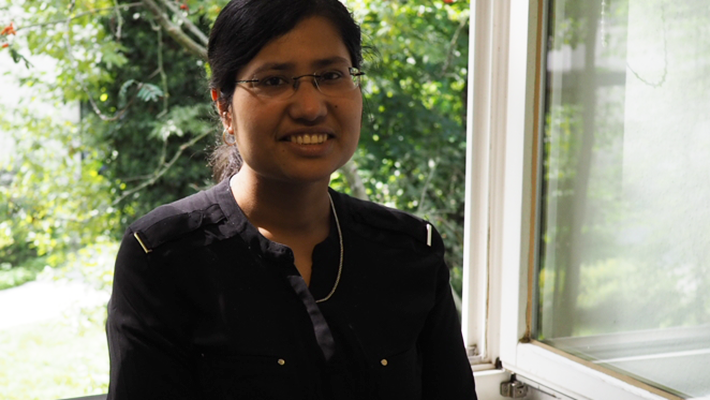Since August 2017 Humboldt Postdoc fellow Poulomi Ganguli is working in the GFZ section Hydrology. Staying for two years at the GFZ the hydrologist will address how climate change is affecting the risk of a joint occurrence of storm surges and river floods in the North Sea region, the so-called compound flooding events.
GFZ: What is the aim of your research project?
Poulomi Ganguli: I would like to understand how compound flooding in European coastal regions is related to climate change and natural variability. While climate change refers to long-term changes over centuries such as global warming, short-term changes are due to natural variability. This includes, for example, changes caused by factors such as the El Niño Southern Oscillation.
Considering space-time changes in several mutually correlated variables, like heavy precipitation, storm surge, or river floods, makes the research on compound extremes especially challenging.
Existing studies mainly focus on storm surges without accounting for river floods and their impact on coastal regions. From a hydrologist perspective it is, however, especially interesting to investigate these compound flooding events and their devastating consequences on coastal regions.
GFZ: Can you give an example of a compound flooding event?
Ganguli: One example is the 2013 winter storm ‘Xaver’ that affected large parts of Northern Europe and caused monetary losses of around 700 million to 1.4 billion Euros. Other examples are the recent storms ‘Eva’, ‘Desmond’, and ‘Imogen’ over the UK that caused significant losses in terms of life and property.
GFZ: You are integrating several data within a computer model that you are programming yourself. Where do the data come from?
Ganguli: I don’t do my own measurements but rely on existing data sets that come from various sources, such as ground based observations at various temporal resolutions, ranging from hourly to daily measurements, or from results of climate model simulations. Some of these data are freely available for academic use others are available on request.
GFZ: You have already been working on droughts and floods in North America and South Asia, for example. How did you “end up” working on compound floodings in the North Sea?
Ganguli: So far, I gained experience in working with different forms of extremes, but only when they occur in isolation. In my new project here at the GFZ I am excited to work on the compound extremes which will consider joint effects of different extremes when they occur simultaneously.
With my working group we chose the North Sea region primarily for two reasons: First of all, the data base is very good. Records reach back down to the late 19th century and suggest increased storminess in the region since then. Secondly, past studies show a substantial increase in insurable losses due to climate change effects on storm surges, like changes in sea level. This means climate change does have an impact that we will be able to access in detail within my project.
31.08.2017. Interview: Ariane Kujau








![[Translate to English:] Torsten Sachs in front of a climate station on a field](/fileadmin/_processed_/3/9/csm__TorstenSachs_bearbeitet_GS_4a1365ef84.jpeg)

![[Translate to English:] left image flood at the Ahrtal: image from above, several houses are flooded; left image:: Heidi Kreibich;](/fileadmin/_processed_/4/4/csm_Bild2_9af0130e9f.png)



![[Translate to English:] Start der Vega Rakete](/fileadmin/_processed_/6/4/csm_20231201-kachel_Vega-VV23-launch_ESA-CNES-Arianespace_706716b68c.jpeg)









![[Translate to English:] Poster exhibition at the Brandenburg Hydrogen Day at the GFZ, some participants in the foreground](/fileadmin/_processed_/6/5/csm_Erster_Brandenburgischer_Wasserstofftag_GFZ_402fcec95e.jpeg)
![[Translate to English:] Group picture of the participants](/fileadmin/_processed_/9/4/csm_20231108_CAWa-Workshop-Tashkent_Gruppenbild_99ea779d8a.jpeg)

![[Translate to English:] [Translate to English:] Hörsaal](/fileadmin/_processed_/e/6/csm_H%C3%B6rsal_e21ac645fb.jpeg)


![[Translate to English:] The Delegations in the Historic Library on the Telegrafenberg. In the back there are from left to right, the Dutch Ambassador for Germany, Ronald van Roeden, the Dutch Minister for Education, Culture and Science, Robbert Dijkgraaf and the scientific director of the GFZ, Susanne Buiter.](/fileadmin/_processed_/d/b/csm_Kachel-2_9eba4b4212.jpeg)

